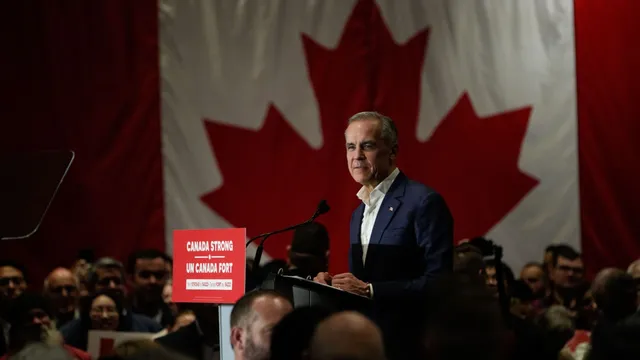
Canadians elect Mark Carney as Liberal leader amid Trump tensions
2025-04-27 05:15- Mark Carney was elected leader of the Liberal Party on March 14, 2025, following Justin Trudeau's resignation.
- The Canadian political climate has shifted, influenced by President Trump's comments regarding Canada.
- Canadians view the upcoming election as a critical moment for their national identity amid increased U.S. tensions.
Express your sentiment!
Insights
In Canada, the political landscape shifted dramatically following the resignation of former Prime Minister Justin Trudeau. The Liberal Party was under pressure to find a strong candidate to contend against the Conservative Party led by Pierre Poilievre, especially in light of various crises that had dampened public trust in the current government. On March 14, 2025, Mark Carney, a prominent figure with experience as the former governor of both the Bank of Canada and the Bank of England, was elected leader of the Liberal Party. His rise came at a crucial time, as President Donald Trump's comments regarding Canada's sovereignty began to resonate, altering the dynamics of the election campaign. Carney entered the scene shortly before the federal election, aiming to address rising public concerns related to the U.S.-Canada relationship. As the election approached, many Canadians expressed their sentiments regarding the looming impact of Trump’s presidency on their national identity. Reports indicated that Canadians were feeling a mix of pride and vulnerability, as they grappled with perceptions of being annexed or undermined by the U.S. Carney's leadership style centered around fostering trade relations with European allies, including France and the UK, as a counterbalance to the threats posed by the United States. His approach was characterized by an ethos encapsulated in the phrase “elbows up,” which emphasized both resilience and proactive engagement in international relations. Meanwhile, the Conservative Party, led by Pierre Poilievre, faced a challenge in shifting its narrative from focusing on their predecessors' failings to establishing a response strategy against Trump's antagonistic rhetoric. Poilievre initially appeared poised for success, but the election landscape rapidly changed. His campaign had to adapt to the new concerns about Canadian sovereignty, which were exacerbated by popping tensions with Trump and the negative portrayal that followed. As the election date loomed, various geographic and demographic considerations were noted. Support was notably evident throughout different regions, with voters considering their district representatives alongside broader party platforms. The presence of the Green Party and its limited but strategic positioning in Parliament reflected the diversity of choices available to voters. Ultimately, the political situation in Canada during this election cycle can be viewed as a product of domestic discontent intertwined with foreign pressures, culminating in a pivotal moment for the Liberal Party and the Canadian populace at large.
Contexts
The impact of Donald Trump on Canadian politics has been a subject of significant analysis since his rise to prominence in the 2016 United States presidential election. Trump's distinctive approach to governance and foreign policy has fundamentally reshaped the political landscape not only in the U.S. but also in Canada. His emphasis on an 'America First' policy, characterized by protectionism and a focus on bilateral trade deals, has led to tensions in the Canada-U.S. relationship, particularly concerning trade agreements such as NAFTA, later renegotiated as USMCA. The Canadian government's response to these developments has led to a shift in focus toward strengthening domestic industries while also seeking to diversify trade relationships beyond the U.S. This strategic pivot has influenced Canadian political discussions around economic resilience and national sovereignty. Moreover, Trump's populist rhetoric and approach to immigration have resonated within certain segments of the Canadian electorate, leading to a rise in similar sentiments in Canadian politics. Political parties in Canada have increasingly found themselves navigating these waters, with some adopting tougher stances on immigration to satisfy their voter bases. This has provoked intense debate about the values of inclusiveness and multiculturalism that Canada traditionally champions, highlighting a potential ideological rift between the sentiments reflected in Trump's policies and those commonly held in Canadian society. Additionally, Trump's foreign policy towards China and Russia has instigated shifts in Canadian diplomacy. The U.S.'s focus on confronting China and promoting NATO reinvigoration has prompted Canada to reassess its own foreign policy priorities. As Canada grapples with its position on global trade and security, there is an increased emphasis on maintaining a strong relationship with traditional allies while cautiously engaging with emerging powers. This geopolitical recalibration has required Canadian politicians to take a firmer stance on issues like human rights and international law, areas where Trump's administration faced criticism. In light of these influences, Canada has experienced a complex interplay between domestic politics and the implications of U.S. policy under Trump. Canadian leaders have been compelled to respond not only to the immediate impacts of U.S. policies but also to the long-term implications of shifting political sentiments within their own borders. The legacy of Trump's presidency, therefore, continues to inform key discussions within Canadian political spheres, shaping electoral strategies, public opinions, and ultimately the governance of the nation as it seeks to balance its own values with the realities of a changing North American relationship.